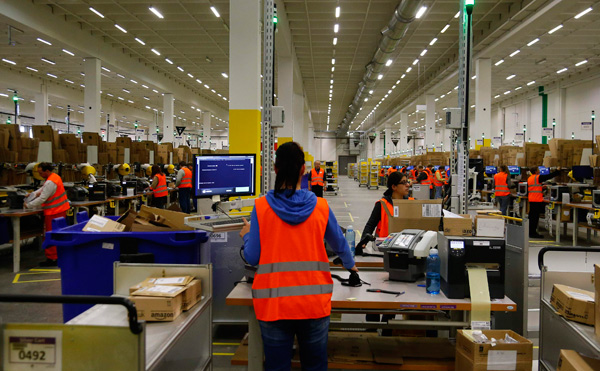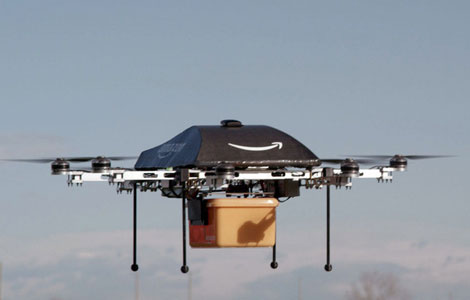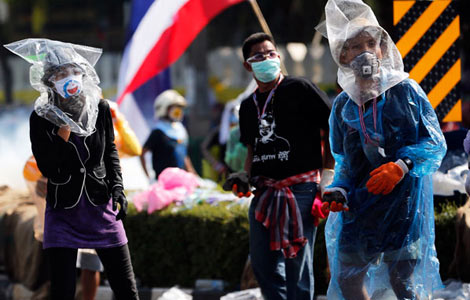Amazon testing delivery with drones
Updated: 2013-12-03 02:50
(Agencies)
|
||||||||
 |
|
Workers handle items for delivery at Amazon's new distribution center in Brieselang, near Berlin November 28, 2013. The world's largest e-commerce company said it's working on a way to get customers their goods in 30 minutes or less by drone. [Agencies] |
NEW YORK - Amazon.com is working on a way to get customers their goods in 30 minutes or less by drone.
The world's largest e-commerce company said it's working on the so-called Prime Air unmanned aircraft project in its research and development labs. But Amazon says it will take years to advance the technology and for the Federal Aviation Administration to create the necessary rules and regulations.
The project was first reported Sunday by CBS' "60 Minutes" TV newsmagazine.
Amazon CEO Jeff Bezos said in a primetime interview that while the octocopters look like something out of science fiction, there's no reason they can't be used as delivery vehicles.
Bezos said the drones can carry packages that weigh up to five pounds (2.3 kilograms), which covers about 86 percent of the items Amazon delivers. The current generation of drones the company is testing has a range of about 10 miles (16 kilometers), which Bezos noted could cover a significant portion of the population in urban areas.
While it's tough to say exactly how long it could take the project to get off the ground, Bezos told "60 Minutes" that he thinks it could happen in four or five years.
One of the biggest promises for civilian drone use has been in agriculture.
The unmanned aircraft can fly over large fields and search out bugs, rodents and other animals that might harm crops. Then, thanks to GPS, another drone could come back and spread pesticide on that small quadrant of the field.
Agriculture is also seen as the most-promising use because of the industry's largely unpopulated, wide open spaces. Delivering Amazon packages in midtown Manhattan will be much trickier.
Besides regulatory approval, Amazon's biggest challenge will be to develop a collision avoidance system, said Darryl Jenkins, a consultant who has given up on the commercial airline industry and now focuses on drones.
Who is to blame, Jenkins asked, if the drone hits a bird, crashes into a building? Who is going to insure the deliveries?
There are also technical questions. Who will recharge the drone batteries? How many deliveries can the machines make before needing service?
"Jeff Bezos might be the single person in the universe who could make something like this happen," Jenkins said. "For what it worth, this is a guy who's totally changed retailing."
The biggest losers could be package delivery services like the US Postal Service, FedEx and UPS.
FedEx spokesman Jess Bunn said in an email: "While we can't speculate about this particular technology, I can say that making every customer experience outstanding is our priority, and anything we do from a technology standpoint will be with that in mind."
Amazon's stock dipped $1.98, or less than one percent, to $391.64 in Monday morning's trading.

 Amazon.com sees delivery drones in the future
Amazon.com sees delivery drones in the future
 Simulated archaeology takes you back in time
Simulated archaeology takes you back in time
 Pictures of Year 2013 by Reuters
Pictures of Year 2013 by Reuters
 Thai PM calls for talks, protest leader defiant
Thai PM calls for talks, protest leader defiant
 'Cyber Monday' sales set to hit record
'Cyber Monday' sales set to hit record
 Tapping the power of youth volunteers
Tapping the power of youth volunteers
 Shanghai braces for second day of severe pollution
Shanghai braces for second day of severe pollution
 Private hospitals face challenges
Private hospitals face challenges
Most Viewed
Editor's Picks

|

|

|

|

|

|
Today's Top News
US calls for release of American jailed in Cuba
Staggered flu shot plan best for China: study
Online shopping changing retail world
House hunting the world in Chinese
China-UK collaboration is about time: President Xi
Biden under pressure to calm tensions
'Go Global' pushing up China M&A
Credit agency sees US downgrade
US Weekly

|

|




